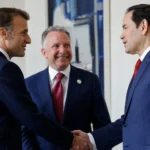Energy News Beat
President Biden vetoed a bipartisan resolution Wednesday that would have reversed his administration’s decision to waive “Buy America” requirements for taxpayer-funded electric vehicle (EV) charging stations.
The resolution, which was authored by Sen. Marco Rubio, R-Fla., and introduced in July, would have specifically overturned the Department of Transportation’s (DOT) Waiver of Buy America Requirements for Electric Vehicle Chargers. Rubio, the vice chairman of the Senate Select Committee on Intelligence, and other Republican lawmakers argued DOT’s waiver benefits Chinese manufacturers who dominate the EV charger supply chain.
“If enacted, this resolution would harm my Administration’s efforts to encourage investment in critical industries and bring high-quality jobs back to the United States,” Biden said in a statement Wednesday. “It would not only thwart the collective goal of the Congress and the Administration to establish a domestic EV charger manufacturing industry, but it would also delay the significant progress being made by my Administration and the States in establishing the EV charging network.”
“Establishing resilient supply chains is critical to our national economic and energy security, and my Administration will not support policies that would undermine efforts to bring this critical manufacturing back to the United States,” the president continued.
A driver charges his electric vehicle at a charging station in Monterey Park, California, on August 31, 2022.
Biden further argued that his administration’s actions in effect promote domestic manufacturing while the Senate resolution would do the opposite. But he acknowledged the DOT waiver allows newly announced manufacturing capacity for EV charger components “the necessary time to ramp up production.”
17 RETIRED MILITARY OFFICIALS RAISE ALARM ON BIDEN’S ELECTRIC VEHICLE PUSH
DOT unveiled the final Made in America EV charger waiver rule in February 2023 which axed more stringent requirements and pushed certain deadlines back months what was considered a victory for green energy industry groups. The waiver governs manufacturing and assembly requirements for EV charging companies to be eligible for millions of dollars in federal subsidies.
The waiver rules revised a stricter proposal put forth by DOT in August 2022. The four-phase proposed waiver would have immediately scrapped all requirements; then required EV charger companies to assemble all products in the U.S. beginning Jan. 1, 2023; manufacture chargers with no less than 25% American-made components by cost beginning July 1, 2023; and manufacture chargers with no less than 55% American-made components by cost beginning Jan. 1, 2024.
President Biden previously set a goal of ensuring 50% of car purchases are electric by 2030.
The finalized waiver finalized in 2023 knocked it down to a two-phase process and pushed key deadlines back. It requires EV charger companies to ensure final assembly of chargers is in the U.S. and that the cost of American-made components in chargers represents 55% of total product costs beginning on July 1, 2024. The waiver notably scrapped the 25% domestic component requirement.
“The bottom line is this: if we’re going to spend $5 billion of taxpayer money to build electric vehicle charging stations for the United States, it should be made by Americans in America using American products,” Rubio said in a floor speech in November.
“Joe Biden and his America Last agenda would sooner invest taxpayer money into Communist Chinese EV chargers than American-made products,” House Republican Chair Elise Stefanik, R-N.Y., added this month. “The Buy America provision is meant to support American businesses and bolster U.S. manufacturers, neither of which this pro-Communist China Administration is interested in.”
“The bottom line is this: if we’re going to spend $5 billion of taxpayer money to build electric vehicle charging stations for the United States, it should be made by Americans in America using American products,” Sen. Marco Rubio, R-Fla., said late last year.
The Senate passed the resolution in November by a 50-48 vote with Sens. Sherrod Brown, D-Ohio; Joe Manchin, D-W.Va.; Jon Tester, D-Mont.; and Kyrsten Sinema, I-Ariz., joining Republicans. Then, on Jan. 11, the House passed the bill in a 209-198 vote with two House Democrats, Reps. Jared Golden of Maine and Donald Davis of North Carolina, joining 207 Republicans who voted in favor.
DOT’s waiver was finalized as part of Biden administration’s push to both expand EV manufacturing and the network of chargers nationwide needed to fuel zero-emissions vehicles. Biden has set goals of constructing an EV charging network of 500,000 chargers along U.S. highways and ensuring 50% of all new car sales are electric by 2030.
The Infrastructure Investment and Jobs Act, the massive infrastructure package Biden signed in 2021, earmarks $7.5 billion for EV charging programs while the 2022 Inflation Reduction Act expands tax credits for EVs and charger installations.
The post Biden vetoes bipartisan bill protecting US EV industry from China appeared first on Energy News Beat.







